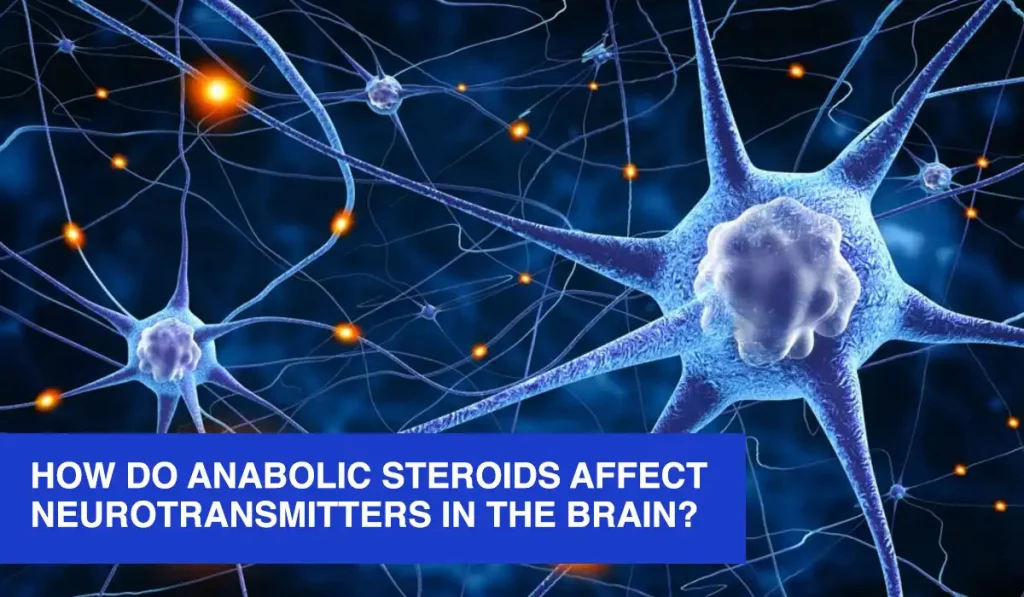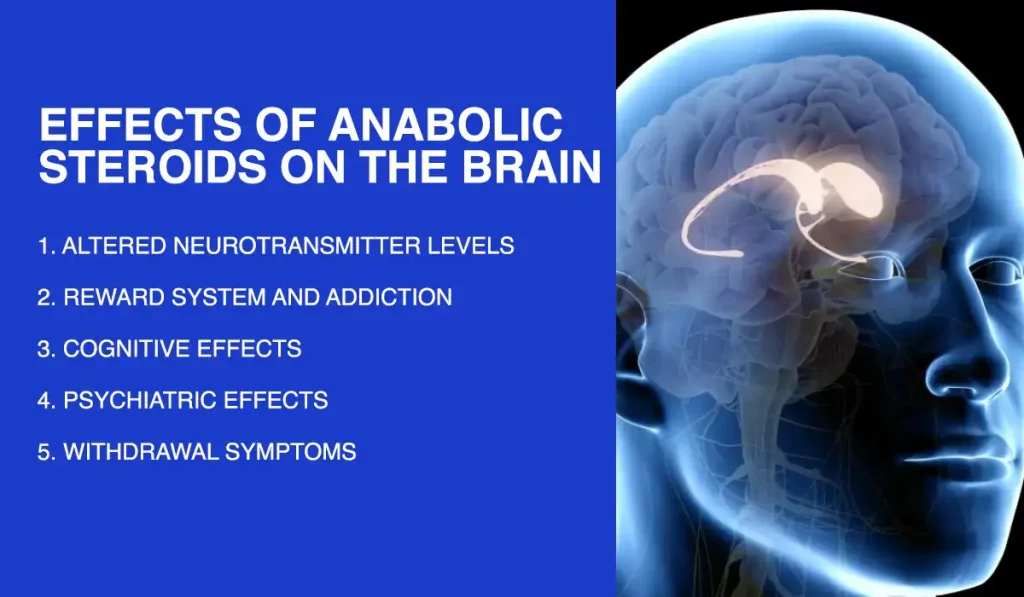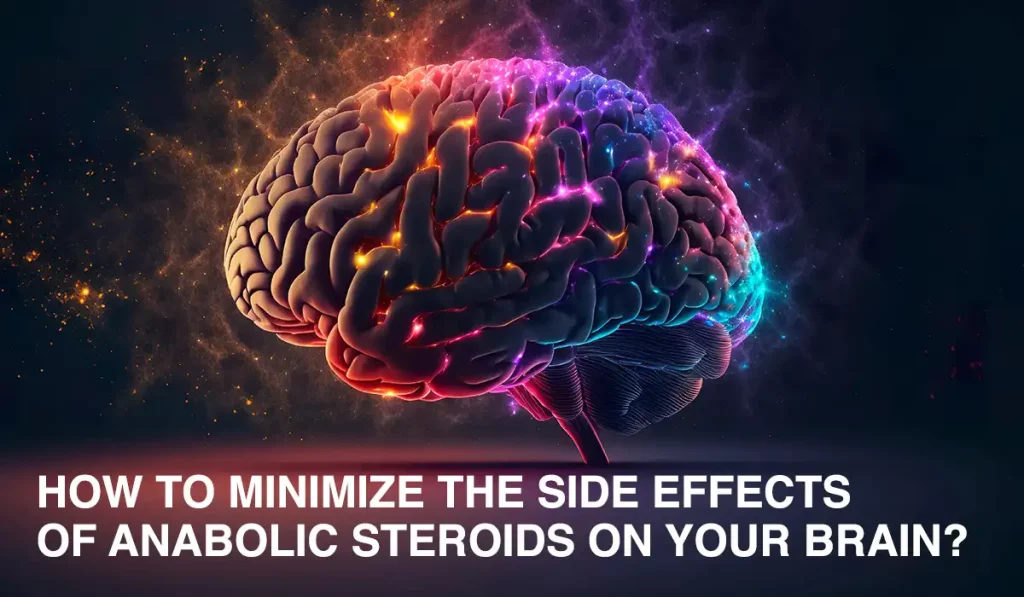FREE SHIPPING ON ORDERS $99+ | SAME DAY SHIPPING ON ORDERS PLACED BEFORE 12PM PST
Impact of Anabolic Steroids on the Brain: Exploring the Neurocognitive Implications of Anabolic Steroid Use
Contents
- How Do Androgenic Anabolic Steroids Affect the Brain?
- How Do Anabolic Steroids Affect Mental Health?
- Effects of Anabolic Steroids on the Brain
- HOW TO MINIMIZE THE SIDE EFFECTS OF ANABOLIC STEROIDS on YOUR BRAIN?
- FAQs
- Final Thoughts: Impacts On The Brain When You Use Anabolic Steroids
The use of anabolic steroids has long been associated with enhancing physical performance and muscle growth. These steroids, often used to enhance physical performance, can have profound effects on your brain and emotions.
While the physical repercussions of steroid abuse are widely recognized, the profound effects on mental health often go overlooked.
In the short term, you can grapple with mood swings and heightened aggression, commonly known as “roid rage.” On the flip side, some may experience a surge in energy and self-confidence.
But it doesn’t stop there. The long-term consequences are even more intricate. Prolonged use can lead to anabolic androgenic steroid dependence and withdrawal, cognitive impairments, and mood disorders. In severe cases, psychosis may rear its head, while structural brain changes may become lasting fixtures.
In this blog post, we’ll explore deep into the short and long-term effects, shedding light on a topic that demands attention.
How Do Androgenic Anabolic Steroids Affect the Brain?
Anabolic steroids can disrupt the delicate balance of neurotransmitters, leading to mood swings, aggression, and even psychiatric disorders. According to “Anabolic androgenic steroids accelerate brain aging by P. M. Thorsby” Research reveals a concerning link between prolonged steroid use and an increased risk of depression and anxiety disorders.
Users with over two years of steroid experience face a higher likelihood of encountering these mental health issues compared to non-users. These findings underscore the concerning impact of anabolic steroids on the brain’s well-being.
How Do Anabolic Steroids Affect Neurotransmitters in the Brain?

Anabolic steroids, known for their synthetic mimicry of the male sex hormone testosterone, hold a significant influence on the brain’s neurotransmitter dynamics. This influence extends to both their sought-after effects, such as muscle growth, and the notable adverse reactions.
Research has shown that both oral and injectable steroids have a profound effect on the delicate balance of serotonin and Dopamine. According to “Effects of anabolic-androgens on brain reward function by Emanuela Mhillaj,” Dopamine, a versatile neurotransmitter, plays a pivotal role in controlling various aspects of our physiological and emotional well-being. It is intricately involved in regulating movement, cognitive function, emotional responses, appetite, and the generation of pleasurable sensations.
Here’s a brief overview of how anabolic steroids affect neurotransmitters:
Impact of Anabolic Steroids on Dopamine:
- Increased Dopamine Levels: Anabolic steroids boost dopamine, linked with pleasure and reward, potentially leading to euphoria and psychological dependence.
- Dopamine Production Reduction: Prolonged use may decrease dopamine production, possibly causing mood disorders and depression upon cessation.
Anabolic Steroids and Serotonin:
- Serotonin Level Alterations: These steroids affect serotonin, crucial for mood regulation, aggression, and impulse control.
- Mood Swings and Aggression: Changes in serotonin may cause mood swings and “roid rage,” a form of increased aggression seen in some users.
GABA Interference by Anabolic Steroids:
- Effect on GABA Receptors: Anabolic steroids might disrupt GABA, the brain’s main inhibitory neurotransmitter, potentially leading to greater excitability and anxiety.
Anabolic Steroids’ Relationship with Glutamate:
- Glutamate Pathway Effects: These steroids may influence glutamate, the primary excitatory neurotransmitter, affecting learning and memory.
Influence on Endorphin Production:
- Endorphin Production Changes: Anabolic steroids can alter endorphin levels, the brain’s natural painkillers, possibly leading to reduced pain sensation and increased injury risk due to overexertion.
Individual Factors and Usage Risks:
- Varied Impact: The effect of anabolic steroids on neurotransmitters greatly depends on dosage, use duration, and individual response.
- Health Risks: Non-medical steroid use poses severe health risks, including psychological and neurological effects. Professional medical consultation is essential.
How Do Anabolic Steroids Affect Mental Health?
If you use steroids frequently, describe various emotional and psychological alterations. You can experience shifts in mood, heightened aggression often referred to as “roid rage,” a propensity for violent behaviour, overwhelming frustration, and even depression.
You can also exhibit symptoms of over-competitiveness, excessive anger, and irrational behaviour. Moreover, the risk of addiction or dependence is a looming concern, as regular and heavy steroid use can lead to tolerance and a deep-seated reliance on these substances.
Effects of Anabolic Steroids on the Brain

Here’s an exploration of the five effects of anabolic steroids on the brain:
1. Altered Neurotransmitter Levels
Anabolic steroids can influence the levels of various neurotransmitters in the brain, including dopamine, serotonin, and GABA. These alterations can impact mood and behaviour, potentially leading to mood swings, irritability, and aggression.
2. Reward System and Addiction
Some individuals who abuse anabolic steroids may experience changes in their brain’s reward system. It can increase the risk of addiction, as the drugs may create a sense of euphoria and reward, encouraging continued use.
3. Cognitive Effects
Chronic use of anabolic steroids may lead to cognitive impairments. Some users report difficulties with memory, concentration, and decision-making. These cognitive deficits can persist even after discontinuing steroid use.
4. Psychiatric Effects
Anabolic steroids are associated with an increased risk of psychiatric symptoms, including depression, anxiety, and even psychosis in some cases. These effects can be particularly pronounced when individuals abruptly stop using steroids.
5. Withdrawal Symptoms
When individuals stop using anabolic steroids, they may experience withdrawal symptoms, including depression and fatigue. These symptoms can further impact the brain and emotional well-being.
Short-term Effects of Anabolic Steroids on the Brain
We explore six short-term effects of Anabolic Steroids on the brain below:
1. Mood Swings
Anabolic steroids can cause unpredictable and intense mood swings. According to “Mood Symptoms in Steroid Users: The Unexamined Role of Concurrent Stimulant Use by Pilar M. Sanjuan” Users might find themselves going from feeling elated to suddenly irritable, with emotions fluctuating dramatically. This emotional instability can strain relationships and impact daily life.
2. Increased Aggression
Anabolic steroid use has been linked to heightened aggression, often referred to as “roid rage.” According to “Anabolic-androgenic steroid administration increases self-reported aggression in healthy males: a systematic review and meta-analysis of experimental studies by Razieh Chegeni” Users may experience uncontrollable anger, leading to impulsive and aggressive behaviors. This aggression can be challenging to manage and may lead to confrontations and conflict.
3. Anxiety
This heightened anxiety may manifest as excessive worrying, restlessness, or even paranoia. Feelings of unease and tension can be unsettling for individuals using these substances.
4. Depression
Individuals may experience sadness, hopelessness, and a lack of interest in previously enjoyed activities. These feelings of despair can be overwhelming and negatively affect mental well-being.
5. Insomnia
Steroid use can disrupt sleep patterns, leading to insomnia or difficulty falling asleep. Poor sleep quality can exacerbate mood disturbances and leave individuals feeling tired and irritable during the day.
6. Difficulty Concentrating
Steroids can manifest as forgetfulness, reduced ability to focus, and overall mental cloudiness. Such cognitive impairments can impact work and daily tasks.
Five Long-term Effects of Anabolic Steroids on the Brain
The Five Long-term Effects of Anabolic Steroids on the Brain are discussed below:
1. Reduced Brain Size
Prolonged use of anabolic steroids can lead to a decrease in your brain size. This reduction in brain volume may result from alterations in neural connections and an increased risk of brain atrophy. A shrinking brain can impact cognitive abilities and overall brain health.
2. Decreased Cognitive Function
Anabolic steroid abuse has been linked to a decline in cognitive function. According to “Brain and Cognition Abnormalities in Long-Term Anabolic-Androgenic Steroid Users by Marc J. Kaufman” You can face difficulties with memory, learning, and problem-solving. Reduced cognitive function can affect your daily life and may persist even after discontinuing steroid use.
3. Increased Risk of Mental Disorders
Anabolic steroids have been linked to an increased risk of developing mental disorders, such as depression, anxiety, and even psychotic symptoms. The long-term use of these substances can contribute to the onset and persistence of these conditions.
4. Stroke
Steroid abuse can lead to high blood pressure, atherosclerosis, and other cardiovascular issues, which collectively elevate the chances of experiencing a stroke. Strokes can result in severe brain damage, affecting cognitive and physical functions.
5. Brain Tumors
While the precise mechanisms are not entirely clear, some studies have shown a correlation between steroid abuse and the development of tumours in the brain. These tumours can be life-threatening and may require invasive treatments like surgery and radiation therapy.
HOW TO MINIMIZE THE SIDE EFFECTS OF ANABOLIC STEROIDS on YOUR BRAIN?

Here are ten tips to minimize the side effects of anabolic steroids:
- Maintain a healthy lifestyle.
- Monitor cardiovascular health.
- Protect the liver by avoiding alcohol.
- Limit the duration of use.
- Practice proper injection techniques.
- Have a cessation plan.
- Explore non-steroidal treatment alternatives.
- Use them under medical supervision.
- Follow prescribed dosages. And always end a steroid cycle with a proper PCT cycle.
- Schedule regular check-ups.
If you are completely new to Anabolic Steroids and don’t know how to get started, read this: Steroid Cycle for Absolute Beginners.
FAQs
What Are the Effects of Anabolic Steroids on the Heart?
Anabolic steroids can lead to a temporary rise in your blood pressure, which, in turn, increases the risk of coronary artery disease due to prothrombotic effects. Additionally, these steroids can disrupt lipid metabolism, causing an increase in LDL (bad cholesterol) and a decrease in HDL (good cholesterol).
According to “Anabolic Steroid-Induced Myocardial Infarction in a Young Male by Fnu Samreen,” This imbalance further elevates the risk of cardiovascular issues. In the most severe cases, AAS abusers may face life-threatening arrhythmias, potentially leading to sudden cardiac death. These dangers underscore the importance of understanding the heart-related risks associated with anabolic steroid use.
How Do Anabolic Steroids Affect Emotions?
Anabolic Steroids often lead to mood swings, causing individuals to experience heightened irritability, aggressiveness, and even paranoia. You can also feel a surge in confidence, which can sometimes border on overconfidence.
These emotional changes are closely linked to the steroids’ impact on the brain’s neurotransmitters, altering the delicate balance of chemicals that regulate emotions. Additionally, abrupt withdrawal from steroids can induce depression and anxiety, further emphasizing the connection between anabolic steroids and emotions.
What Are the Legal Consequences of Using Anabolic Steroids for Bodybuilding?
Using anabolic steroids for bodybuilding without a valid prescription can result in serious legal consequences. Possession, distribution, or purchase of these substances without a prescription is illegal in many countries, including Canada. If caught, individuals may face charges related to drug possession and trafficking, leading to fines and potential imprisonment.
Read more: How to buy anabolic steroids safely for bodybuilding
What Are the Benefits of Anabolic Steroids?
Anabolic steroid users can see significant advantages in lean muscle mass and performance enhancement. These compounds mimic Testosterone. Bodybuilders use these as performance enhancing drugs to build lean muscle mass faster.
According to “Anabolic Steroids and Sports: Winning at any Cost by James V. McDonald” Athletic prowess is a multifaceted interplay of various factors, such as genetics, age, body size, sex, diet, and the intensity of an athlete’s training regimen. The benefits of anabolic steroids mainly revolve around the augmentation of muscle and body mass.
If you’re looking to buy Canadian steroids for bodybuilding or performance enhancement, you can find the highest quality AAS right here. We offer safe payment options and fast, discreet home delivery.
Final Thoughts: Impacts On The Brain When You Use Anabolic Steroids
Anabolic steroids can have profound effects on your brain and emotions. In the short term, they may lead to mood swings, anxiety, and impulsivity. Long-term use can result in dependence, cognitive impairment, mood disorders, and even psychosis.
Changes in brain structure are possible and can be irreversible. These consequences highlight the importance of informed decision-making and responsible use. However, if don’t misuse anabolic steroids and maintain a proper cycle, you won’t have to face any medical conditions.
Sources
- Corrie Pelc (September 6, 2022) Prescription steroids affect brain structure, study finds
- Astrid Bjørnebekk, Tobias Kaufmann, Lisa E. Hauger, Sandra Klonteig, Ingunn R. Hullstein, Lars T. Westlye (November 30, 2020) Long-term anabolic androgenic steroid use is associated with deviant brain aging
- Astrid Bjornebekk, Tobias Kaufmann, Lisa E. Hauger, Sandra Klonteig, Ingunn R. Hullstein, Lars T. Westlye (May 9, 2021) Long-term Anabolic–Androgenic Steroid Use Is Associated With Deviant Brain Aging
- Lars T. Westlye, Tobias Kaufmann, Dag Alnaes, Ingunn R. Hullstein, Astrid Bjornebekk (October 22, 2017) Brain connectivity aberrations in anabolic-androgenic steroid users
- Farzad Jalilian, Hamid Allahverdipour, Babak Moeini, and Abbas Moghimbeigi (July 25, 2011) Effectiveness of Anabolic Steroid Preventative Intervention among Gym Users: Applying Theory of Planned Behavior
- Monica Salerno, Orazio Cascio, Giuseppe Bertozzi, Francesco Sessa, Antonietta Messina (April 10, 2018) Anabolic androgenic steroids and carcinogenicity focusing on Leydig cell: a literature review
- Marie Lindvik Jørstad, Morgan Scarth, Svenn Torgersen, Harrison Graham Pope, and Astrid Bjørnebekk (July 11, 2023) Clustering psychopathology in male anabolic–androgenic steroid users and nonusing weightlifters
Our dedication to unbiased and meticulously tested bodybuilding supplement recommendations has solidified our position as the most trusted resource in the Canadian bodybuilding community.
Our rigorous editorial process ensures that only the most effective and thoroughly evaluated supplements receive our endorsement.
